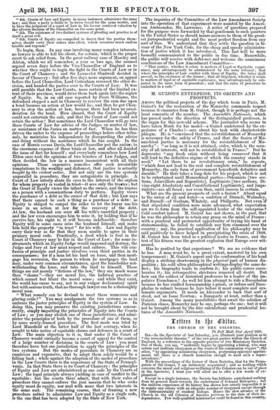M. Guizors ENTERPRISE, ITS OBJECTS AND
PROSPECTS.
AMONG the political projects of the day which teem in Paris, M. Guizot's for the restoration of the Monarchy commands respect because it emanates from M. Guizot, though it is perhaps not the least romantic of the number. The Assemblee Nationale, which has passed under the direction of the distinguished professor, is the organ for this new-old scheme. The journalist who seems to have taken Monk for his model—a Guizot undeterred by the ex- perience of a Charles !—sets about his task with characteristic phlegm. He is " convinced that the reestablishment of Monarchy is necessary for the safety of France, and that the fusion of Mo- narchical parties is necessary for the reestablishment of Mo- narchy" : " so long as it is not attained, order, which is the secu- rity of all interests, will not be reestablished in France." But he deprecates " any fresh crisis without being reassured that it will lead to the definitive regime of which the country stands in need." " Let there be no revolutionary crisis," he repeats, "which does not lead to the real and complete reestablishment of Monarchy, the only form of government henceforth definitive and durable." He thus takes a long date for his project, which is not to be entertained until Monarchical parties—Orleanists [two sec- tions, Joinvillists and Regentists], Legitimists [two sections, Di- vine-right Absolutists and Constitutional Legitimists], and impe- rialists—are all fused ; nor even then, until success be certain.
What are the present prospects of such a fusion ? About equal to the union of oil and water—a coalition of Disraeli, Walmsley, and Russell—of Gorham, Whately, and Phillpotts. But even if that stipulated condition were more advanced, what expectation are we to form from the self-appointed leader of the enterprise ? Cold comfort indeed. M. Guizot has not shown, in the past, that he was the philosopher to retain any grasp on the mind of France : with a practical and protracted opportunity of trying his hand at statesmanship, he failed to establish any firm command over the country ; nay, the practical application of his philosophy may be said positively to have helped in precipitating. the crisis of '1848. M. Guizot has been tried as a political leader in France, and the test of his fitness was the greatest explosion that Europe ever wit- nessed.
Has he profited by that experience ? We see no evidence that he has. A man must be, to a great extent, mastered by his own temperament : M. Guizot's aspect and the conformation of his head display a striking shortcoming in the physical part of human dis- position ; his cold ultra-philosophical writinqs display the same de- fect; his biography tends to confirm it; his public career corro- borates it; his retrospective strictures removed all doubt. But how can the coldest of historical professors be a leader of the im- pulsive Frenchmen ? As well let him attempt to ride a Bucephalus because he has studied horsemanship a priori, or induce said Buce- phalus to submit because he lays before it most complete and sys- tematic arguments. It needs an Alexander to back that sort of steed, not an Isaac Newton; a Bonaparte at least, rather than a Guizot. Among the many possibilities that await the solution of Parisian chaos, Monarchy may be one, perhaps the one ; but it will not be brought about by the nice calculations and prudential lec- tures of the Assemblee Nationale.


























 Previous page
Previous page